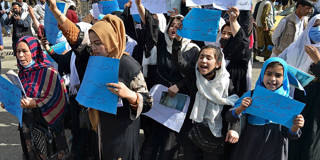One year after the Islamist group returned to power in Afghanistan, most of the country's girls’ secondary schools remain closed. The international community, and especially the Organization of Islamic Cooperation, should make women’s and girls’ rights central to their diplomatic and economic engagement with the Taliban.
LONDON – When Taliban leaders visited an elementary school in Kabul in October 2021, two months after retaking control of Afghanistan, several seven- or eight-year-old girls bravely stood up, one by one, to declare: “Our classes have resumed, but not for our older sisters. We have been promised that our older sisters will return to class, but this has not happened yet!”
Now, on the first anniversary of the Taliban’s return to power, most of Afghanistan’s 1,880 girls’ secondary schools remain closed. And when women and girls demonstrated in Kabul this past weekend, calling for their educational opportunities to be restored, Taliban forces fired shots over the protesters’ heads.
Islam’s holy book, the Koran, encourages both women and men to read, contemplate, and pursue education. The Prophet Muhammad advocated education as a religious duty for males and females: “Seek education from the cradle to the grave,” the Prophet instructed. But the Taliban’s ban on schools for girls above sixth grade has made Afghanistan the only Muslim country to prohibit girls’ secondary education.

LONDON – When Taliban leaders visited an elementary school in Kabul in October 2021, two months after retaking control of Afghanistan, several seven- or eight-year-old girls bravely stood up, one by one, to declare: “Our classes have resumed, but not for our older sisters. We have been promised that our older sisters will return to class, but this has not happened yet!”
Now, on the first anniversary of the Taliban’s return to power, most of Afghanistan’s 1,880 girls’ secondary schools remain closed. And when women and girls demonstrated in Kabul this past weekend, calling for their educational opportunities to be restored, Taliban forces fired shots over the protesters’ heads.
Islam’s holy book, the Koran, encourages both women and men to read, contemplate, and pursue education. The Prophet Muhammad advocated education as a religious duty for males and females: “Seek education from the cradle to the grave,” the Prophet instructed. But the Taliban’s ban on schools for girls above sixth grade has made Afghanistan the only Muslim country to prohibit girls’ secondary education.